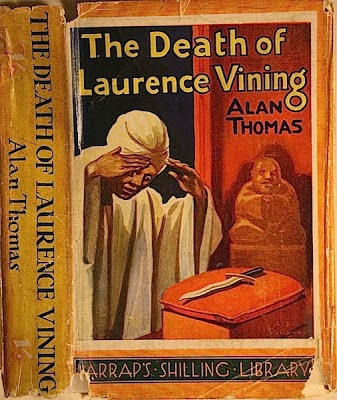Laurence Vining was not a particularly
pleasant man. He was a genius, of course, and the police appreciated his help
on the odd occasion where they found themselves out of their depth. In fact,
just recently, Vining helped to put a murderer behind bars when the police were
quite stumped, solving the mystery of the “Shop Murder”. He solves these cases
with the help of his very own Watson, Dr. Benjamin Willing.
But despite Vining’s ingenuity, he’s a
callous, cold-hearted man who manages to surround himself with enemies. Yet
it’s something of a shock when Vining is murdered in a tube station under
seemingly impossible circumstances! He gets into a lift by himself, and the
operator sends him down— but at the lower level, when the doors are opened,
Laurence Vining tumbles out of the lift dead— a knife plunged into his back.
(The knife is a curious Oriental dagger, as a matter of course.)
The police detective in charge of the
case is Inspector Widgeon, a competent, no-nonsense sort who will use
unorthodox and somewhat unpleasant methods to get results at times. Dr. Willing
is eager to help solve his friend’s murder and thus the investigation is
launched. Things are complicated when Vining’s Malayan servant disappears, as
does his ne’er-do-well nephew. His secretary begins to act fishy. The extremely
racist housekeeper also has something up her sleeve. And then there’s one
Colonel Robinson…
The
Death of Laurence Vining has a reputation as a
minor masterpiece of the impossible crime subgenre, and I have to say it does deliver on that front! I tumbled to
about half the solution, which is extremely ingenious and well-clued. (I do
admit, however, that at one point I got very worried when the author began tossing
around potential solutions that defied the laws of probability, physics, and
reason all at once.) But author Alan Thomas manages to pull the caper off, and
delivers an even better performance explaining the contingency plans. He isn’t
satisfied with giving you just the solution; he gives you all the possible
things that could have gone wrong with the plan. The murderer (let’s just call
the killer Didit and assume he’s male) makes meticulous plans for all these
possible scenarios. I think that that is arguably the most fascinating bit of
the book, as we get to see excerpts from Didit’s journals chronicling the
entire crime.
You might assume based on the
description I’ve given that this book is a parody. Well, although it does poke
fun at some of the genre’s conventions, especially at the beginning, it isn’t a
parody— the crime and its investigation is deathly serious. I think this is the
only thing that the book could really have improved on. While the characters
aren’t terrible, they aren’t particularly revolutionary or memorable, and a
layer of parody could have helped this problem. The book has excellent comic
potential—a Philo-Vance-like amateur sleuth is killed, his “Watson” has to try
solving it himself, etc. I was thinking along the lines of Philo Vance being
murdered by the publisher for being so bloomin’ pedantic! But instead, we focus
a lot more on the investigation that on what an annoying fellow the victim
could be. The Watson character fades into the background after the opening,
popping up intermittently to submit an outlandish solution We’ve seen the
ne’er-do-well nephew and his romantic interest before under many names. The
only remotely interesting characters are the police inspector and the Malayan
servant, Suleiman. (The housekeeper’s unapologetic racism is also
interesting—while she’s a nice person in general, her racism is extremely
repellent and I can’t help but feel that was the author’s intent.) So although
the book’s plot is fine, it tends to sag in the second act when we go through routine
with same-old-same-old characters—and while there is some satire, it’s largely
confined to the beginning of the book and isn’t the laugh-out-loud type of
parody.
But all things considered, despite the
somewhat static second act, The Death of
Laurence Vining certainly lives up to its reputation as a minor
masterpiece. The impossible crime is a genuine delight and even better than the
crime itself are the plans Didit makes in case anything goes wrong. Was it
worth seeking out? Undoubtedly! I enjoyed myself and if you go for these kinds
of books, I think you’ll enjoy it as well. The only problem? It’s not an easy
book to find!
Patrick Ohl ©2014










2 comments:
Shades of Fatal Descent by John Rhode & Carter Dickson.
Having read neither I have nothing to offer.....
Post a Comment